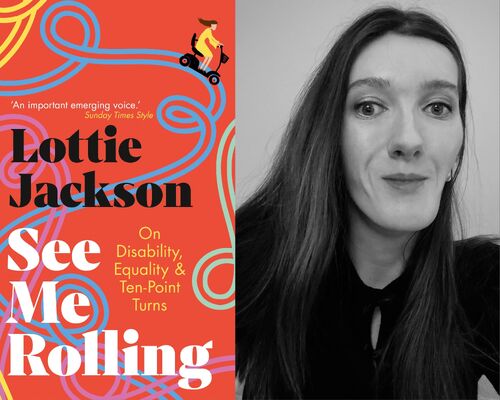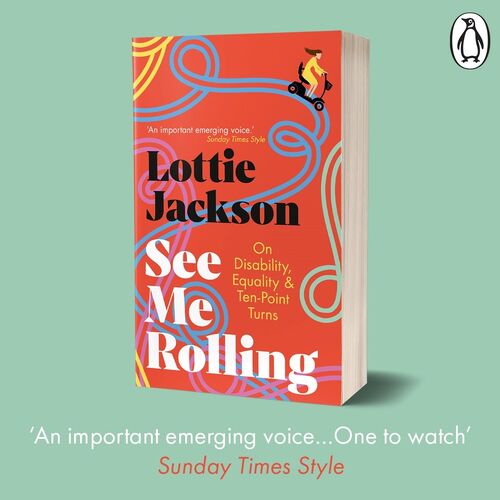Fixing inequality starts with a readiness to ‘see’ disability for what it is: an identity defined by innovation and strength, not failure - Lottie Jackson
May 17 2024

Lottie Jackson is an author, activist and journalist with bylines for The Sunday Times, CNN, Telegraph, Guardian, British Vogue and Elle. She was recently awarded Journalist of the Year at the Scope Equality Awards. She joined us on The DFI Blog for a chat about her new book See Me Rolling which is published by Penguin.
How did the idea for See Me Rolling come about? And what triggered you to write the book?
I began writing See Me Rolling at the start of the pandemic – you can call me a lockdown cliché! My early draft was part of a competition for Penguin’s WriteNow mentorship scheme. What started as 1,000 words for my application eventually led to a book deal and evolved into See Me Rolling.
Penguin’s WriteNow scheme (which is aimed at writers from underrepresented communities) opened the door for me and gave me the chance to get my book published. But, in terms of the catalyst, See Me Rolling was born out of the social climate of the pandemic. I saw how the disruption caused by Covid-19 was prompting us to realign our priorities, to think in new ways. Ideas of community, empathy and social justice became vital in the face of suffering. I thought, why not use this as a ‘reset’ moment to reframe our view of disability? Out of something extremely bleak, I sought an opportunity to promote awareness of the social inequalities affecting the UK’s 13.9 million disabled people.
What topics do you cover in your book?
I’ve tried to give a 360-degree insight into disabled lives. Using my own experiences as a young woman with a muscle weakness disability, I explore a range of issues such as recovery from severe illness, healthcare, university, social media, travel, sex, love, fashion and beauty standards.
See Me Rolling is a memoir that uses humourous anecdotes to redefine what it means to be disabled — from the story of doing a ten-point turn by mobility scooter and a slapstick scuffle with a so-called ‘easy-pull’ tights aid, to the sip of an NHS cuppa (flavour profile: boiled despair). But it’s also an essay collection that tackles the stigma surrounding disability. Compiling insights from writers, philosophers, activists and filmmakers throughout history, I encourage readers to see new ways of existence that lie outside of able-bodied norms.
How do you use humour in your writing? Is comedy important to your style as a writer? 
Comedy — specifically dry and dark humour — is key to my project of redefining disability. I think laughter is a cunning tool to break down taboos and show our human similarities, in the face of perceived differences. One of the quotes at the beginning of See Me Rolling is by Mark Twain who wrote that laughter is humanity’s greatest weapon, ‘against the assault of laughter nothing can stand’. That philosophy runs throughout my book.
But, for me personally, humour as been so important while navigating the world with a disability. If I can laugh at something and shift the focus, it lessens the sense of despair. I’m free to create my own more positive narrative around a situation.
What is the central message of See Me Rolling? What do you want readers to take away from the experience?
At its core, my book proves what can be achieved when we open up our ideas about what constitutes a ‘normal’ body. I needed to show the difficulties and challenges of my disability, but I also felt it was crucial to show the way forward. To say that disability should never limit the trajectory of your life. Here’s how we can improve things. Here’s how we can open up the world to include people with disabilities more.
So, what is your solution for improving disability equality?
Fixing inequality starts with a readiness to ‘see’ disability for what it is — an identity defined by innovation and strength, not failure. I believe one of the biggest barriers facing disabled people is the lack of real understanding, or knowledge, about disability.
Right now, we cannot deny there is still huge stigma and misunderstanding surrounding disability. And often our default response is to ignore disability or hide it away. Just look at the recent scandal where a photography firm offered to remove disabled children from class photos. Clearly, urgent change is needed.
As I argue in my book, we have the opportunity to rewire our social conditioning towards disability. Our failure to do so is creating untold harm on disabled people – a study found that 45 per cent of the British public do not even feel comfortable saying the word ‘disabled’. And two-thirds of the public feel uneasy talking to disabled people. How can we move forward when that’s still the case? If we want to live in a diverse world where disabled people no longer feel segregated and excluded, we must begin to rewrite the definition of what constitutes an acceptable, normal body. That’s what I’ve tried to kick-start in See Me Rolling.
Thanks for joining us Lottie and best of luck with the book.
See Me Rolling is out now – in hardback, e-book and Penguin audiobook. Lottie will also be joining us on our next Podcast to talk about her book.
ENDS
